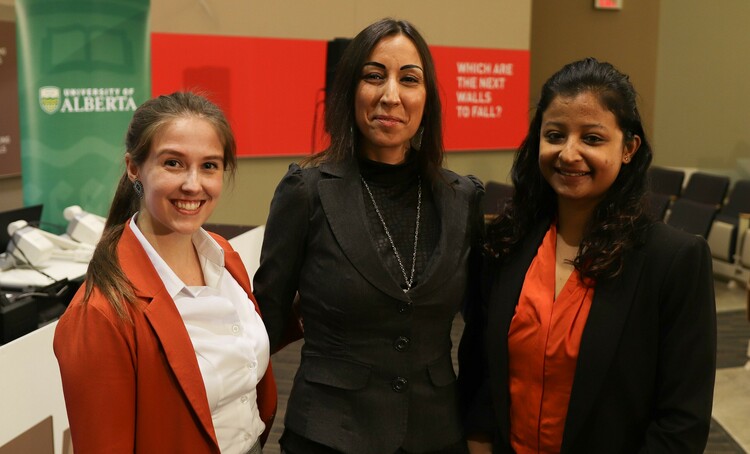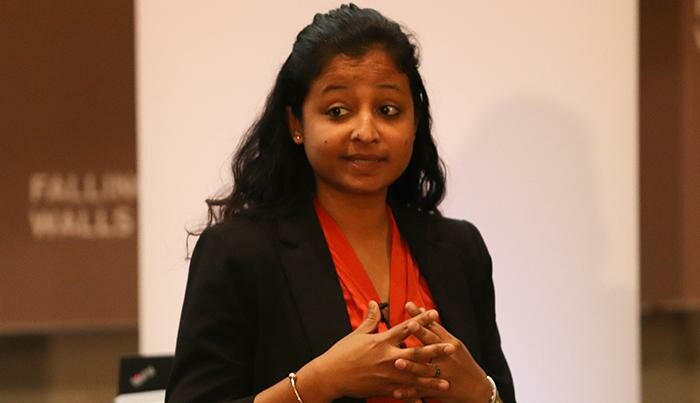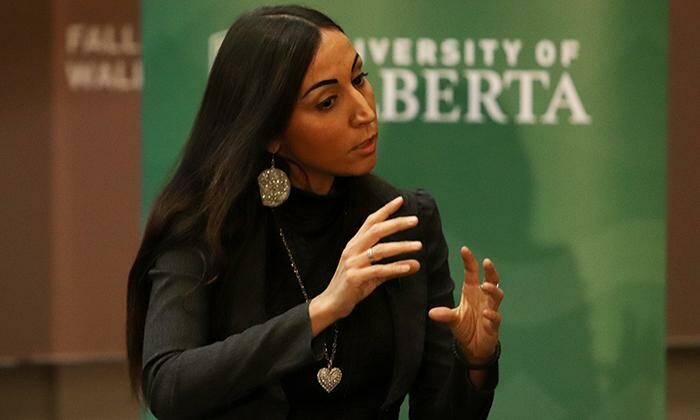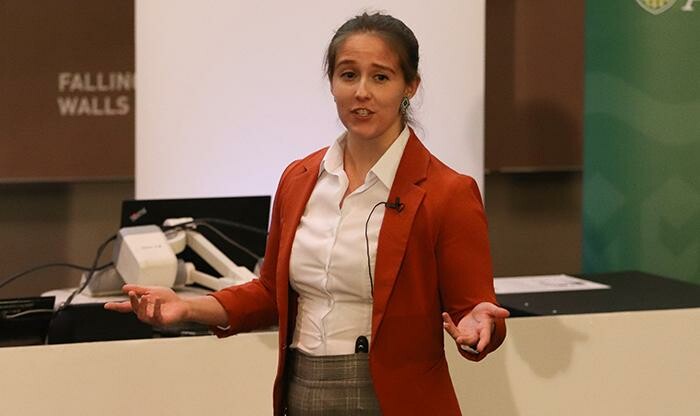Falling Walls Lab 2019 impresses with breakthrough research
Posted on
Future Energy Systems graduate students Makenzie MacKay, Marina Lazic, and Bandita Deka Kalita at the UAlberta Falling Walls Lab.
For Makenzie MacKay, Marina Lazic, and Bandita Deka Kalita, three minutes on stage could be enough time to change the world
On Wednesday, 18 September, at the University of Alberta Falling Walls Lab 2019, fourteen students stood at the front of a crowded lecture hall and delivered passionate speeches summarizing why they think their research will contribute to a better Earth. They had only three minutes each to distill years of work into meaningful and persuasive pitches, highlighting both the problem they’re challenging and how they’ll contribute to a solution. It’s a lot to fit in a short amount of time, and complicated topics need to be described clearly enough to be understood by people of all backgrounds and specializations.
Though divided by discipline and faculty, Bandita (Business), Marina (Science), and Makenzie (ALES) all spoke about different ways of transforming our energy production and use, representing their work done through Future Energy Systems projects.

To Bandita, Alberta's abandoned or orphaned oil and gas wells could present an opportunity –– not an economic liability –– if we can determine how stakeholders make decisions about dealing with them. With the province seeing an increase of over 3,100% in orphaned oil wells between 2012 and 2017, understanding these different perspectives is important and could help policy-makers balance contradictory perspectives of economy and community or environment.

Marina argued for the use of bacteria that eat methane –– a greenhouse gas 30 times more potent than carbon dioxide when emitted into the atmosphere –– and turn it into useful bioproducts. To ensure the technology can be implemented most efficiently, she explained her process of ‘mapping’ the genes responsible for a methane-eating bacteria’s metabolism, essentially creating a Google Maps route through the bacteria to increase product yield.

Makenzie explored the challenges related to energy production in extremely northern remote communities, and the value of a community-led approach to decision-making about energy. She works closely with the Inuvialuit people in Tuktoyaktuk, seeking to understand their perspective on alternative energy sources and develop new approaches to ensure communities can lead their own energy transition decisions.
Competition was stiff. The winner and runner-up would be invited to travel to Berlin to compete in the Falling Walls International Lab in front of an audience of hundreds, and streamed online to thousands more. The event attracts both world-renowned researchers and cutting-edge businesses aiming to solve problems in areas ranging from medicine, to industry, to society at large. Two U of A students previously claimed the 2nd place overall prize, Nermeen Youssef in 2014 and Lian Willetts in 2015.
Determining which two UAlberta competitors would make the trip in 2019 was a jury of experts from academia, government, and industry. These individuals judged the presentations on their breakthrough factor –– how innovative each idea was –– and the relevance or potential impact, as well as the structure and performance of the presentation.
After their deliberations, second place was awarded to Nicole Sanchez for the presentation Breaking the Wall of Menstrual Hygiene. Nicole outlined the aim of her venture Hempact, shared with team-members Anka Chan and Mariam Humayun, is to produce and provide eco-friendly menstrual products for women around the world, reducing waste and promoting sustainability as well as education on women’s hygiene.
First place went to Ryaan El-Andari for Breaking the Wall of Heart Valve Replacements. His work focuses on increasing the suitability of heart valve replacements, using stem cell technology to produce replacement tissue that the immune system is less likely to attack. This makes the artificial valves longer-lasting and reduces the number surgeries affected patients will require over their lives.
Though not all the competing students will get to move on to the international stage, their passion, practice, and discipline in this competition was clear, and will surely be of benefit in the rest of their graduate school careers and beyond.
Congratulations to all the competitors, and to the Makenzie, Marina, and Bandita for representing Future Energy Systems!
To learn more about...
Makenzie's project, Wind Energy in the Beaufort Delta - Inuvik, click here.
Marina's project, Bioconversion of Single-Carbon Effluents into Biofuels and Biofuel Precursors, click here.
Bandita's project, Moving Forward by Overcoming the Legacies of Past Energy Systems Project, click here.
You can also watch Marina's Bite Size Research here: